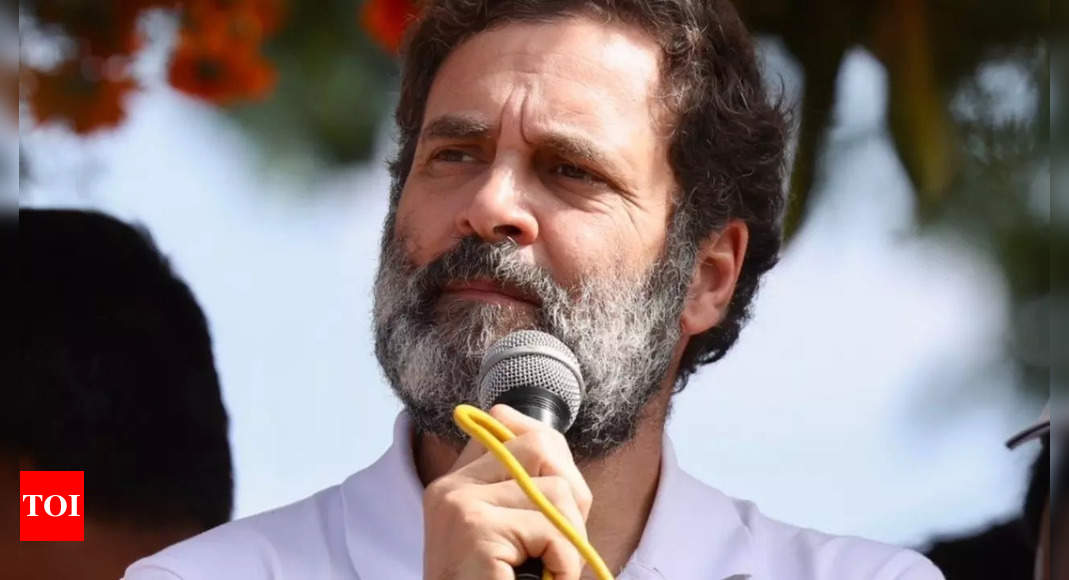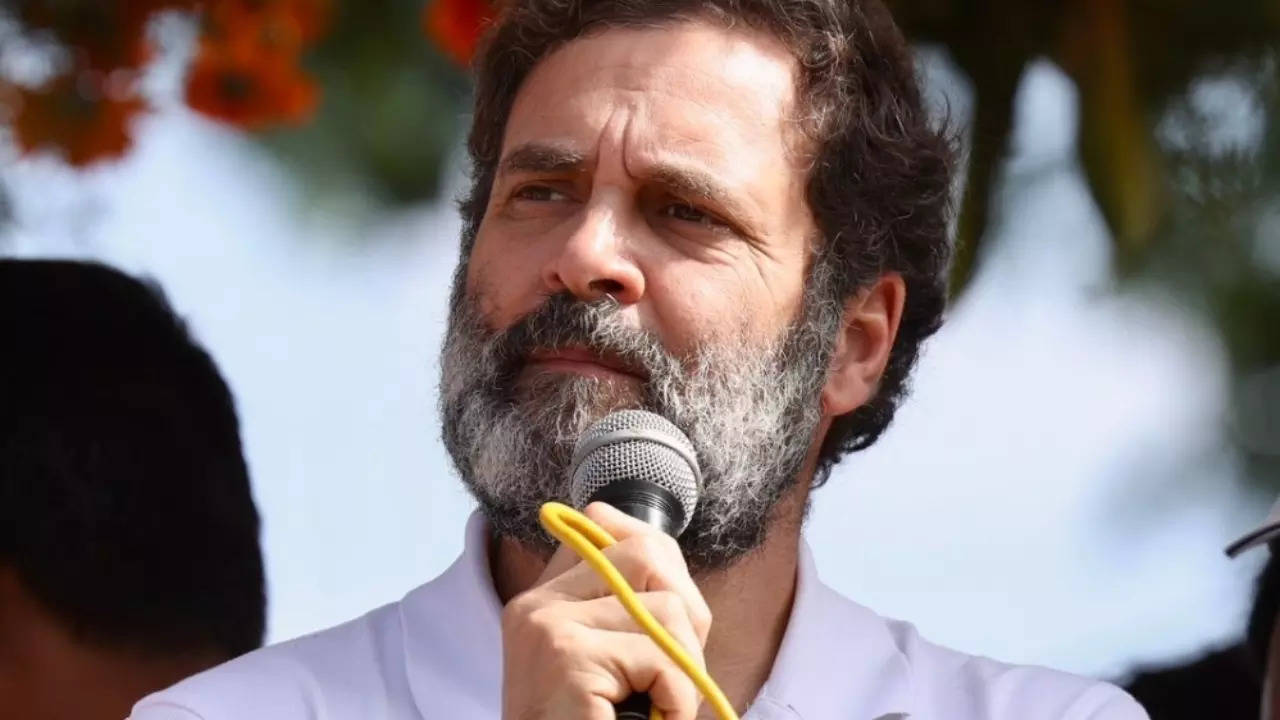[ad_1]
NEW DELHI: Former Congress president Rahul Gandhi’s trysts with the Supreme Court is caused by two statements, separated by just three days, he made in the heat and dust of campaigning during the last general elections in April 2019.
He was forced to tender an unconditional apology in May 2019 to the SC in a case relating to the Rafale fighter jet deal with France. The other statement resulted in a trial court conviction in a defamation case, in which he would know on July 21 whether or not the SC would stay his conviction to enable his reinstatement as MP.
While campaigning in Amethi, from where he lost to Smirit Irani by over 55,000 votes, he referred to the SC’s decision to consider the leaked papers relating to Rafale fighter jet deal with France while hearing review petitions, and said on April 10, “The SC has made it clear that “chowkidarji (watchman) has committed a theft.” BJP leader Meenakshi Lekhi filed a contempt plea against Gandhi.
Initially he responded with a regret within brackets for his faux pass for wrongly attributing endorsement of his statement to the SC. But when the court turned the heat on him, he tendered an unconditional apology seeking reprieve from the contempt heat.
The bench accepted his belated apology. Earlier Gandhi had said that ‘chowkidar chor’ jibe was hurled in a ‘rhetorical flourish in the heat of the moment” and that his statement has been used and misused by his political opponents to project that he had deliberately attributed the utterances to the SC. With apology, he had clarified that the attribution to SC was “unintentional, non-willful and inadvertent”. The latter affidavit saved Gandhi the blues but not the blushes.
SC in its November 14, 2019, judgment had said, “It is unfortunate that without verification or even perusing as to what is the order passed, Gandhi deemed it appropriate to make statements as if this court had given an imprimatur to his allegations against the Prime Minister, which was far from the truth. This is not one sentence, or a one-off observation but a repeated statement in different manners conveying the same. No doubt the contemnor should have been more careful.” It closed the contempt proceedings “with a word of caution for the contemnor to be more careful in future.”
For his statement at an election rally at Kolar near Bengaluru on April 13, 2019, just three days after his ‘chowkidar chor’ remark at Amethi, his Modi-surname remark led to filing of a defamation case by a BJP activist Purnesh Ishwarbhai Modi at Surat for allegedly defaming all persons having Modi surname.
The Chief Judicial Magistrate, Surat, convicted Gandhi on March 23 and sentenced him to 2 years imprisonment, which led to his disqualification as the MP from Wayanad, from where he had won by a record margin of over 4.31 lakh votes in 2019, on March 24. He appealed against the decision before the sessions court and sought a stay of conviction. But the sessions court rejected his plea for stay. His appeal before the HC against rejection of stay of conviction was dismissed on July 7, forcing him to move the SC which is scheduled to hear his plea on July 21.
Apart from seeking stay of conviction on many grounds including an assertion that the trial court “frivolously” convicted him despite complete absence of ingredients and evidence constituting the offence of defamation, there is one ground common in the two cases – Gandhi’s assertion that is a political vendetta by BJP and its supporters to stifle his free speech and eliminate political debate in a democracy. What stares at Gandhi is the concurrent rejection of stay by the sessions court and the HC to stay his conviction. The HC had remarked on the lines similar to what the SC had told him in November 2019 – “We do believe that persons holding such important positions in the political spectrum must be more careful.”
He was forced to tender an unconditional apology in May 2019 to the SC in a case relating to the Rafale fighter jet deal with France. The other statement resulted in a trial court conviction in a defamation case, in which he would know on July 21 whether or not the SC would stay his conviction to enable his reinstatement as MP.
While campaigning in Amethi, from where he lost to Smirit Irani by over 55,000 votes, he referred to the SC’s decision to consider the leaked papers relating to Rafale fighter jet deal with France while hearing review petitions, and said on April 10, “The SC has made it clear that “chowkidarji (watchman) has committed a theft.” BJP leader Meenakshi Lekhi filed a contempt plea against Gandhi.
Initially he responded with a regret within brackets for his faux pass for wrongly attributing endorsement of his statement to the SC. But when the court turned the heat on him, he tendered an unconditional apology seeking reprieve from the contempt heat.
The bench accepted his belated apology. Earlier Gandhi had said that ‘chowkidar chor’ jibe was hurled in a ‘rhetorical flourish in the heat of the moment” and that his statement has been used and misused by his political opponents to project that he had deliberately attributed the utterances to the SC. With apology, he had clarified that the attribution to SC was “unintentional, non-willful and inadvertent”. The latter affidavit saved Gandhi the blues but not the blushes.
SC in its November 14, 2019, judgment had said, “It is unfortunate that without verification or even perusing as to what is the order passed, Gandhi deemed it appropriate to make statements as if this court had given an imprimatur to his allegations against the Prime Minister, which was far from the truth. This is not one sentence, or a one-off observation but a repeated statement in different manners conveying the same. No doubt the contemnor should have been more careful.” It closed the contempt proceedings “with a word of caution for the contemnor to be more careful in future.”
For his statement at an election rally at Kolar near Bengaluru on April 13, 2019, just three days after his ‘chowkidar chor’ remark at Amethi, his Modi-surname remark led to filing of a defamation case by a BJP activist Purnesh Ishwarbhai Modi at Surat for allegedly defaming all persons having Modi surname.
The Chief Judicial Magistrate, Surat, convicted Gandhi on March 23 and sentenced him to 2 years imprisonment, which led to his disqualification as the MP from Wayanad, from where he had won by a record margin of over 4.31 lakh votes in 2019, on March 24. He appealed against the decision before the sessions court and sought a stay of conviction. But the sessions court rejected his plea for stay. His appeal before the HC against rejection of stay of conviction was dismissed on July 7, forcing him to move the SC which is scheduled to hear his plea on July 21.
Apart from seeking stay of conviction on many grounds including an assertion that the trial court “frivolously” convicted him despite complete absence of ingredients and evidence constituting the offence of defamation, there is one ground common in the two cases – Gandhi’s assertion that is a political vendetta by BJP and its supporters to stifle his free speech and eliminate political debate in a democracy. What stares at Gandhi is the concurrent rejection of stay by the sessions court and the HC to stay his conviction. The HC had remarked on the lines similar to what the SC had told him in November 2019 – “We do believe that persons holding such important positions in the political spectrum must be more careful.”
[ad_2]
Source link











More Stories
Congress replaces Kamal Nath, names an OBC as Madhya Pradesh chief | India News
Fire breaks out in ITBP camp in Srinagar; none hurt | India News
Parliament Security: Co-villagers give clean chit to Lalit Jha, parents to move court | India News